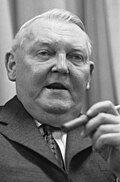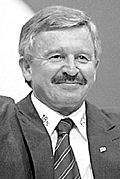This is a List of Economics Ministers of Germany from 1919 to the present.
This is a List of Economics Ministers of Germany from 1919 to the present.
Political Party: SPD DDP DVP Independent
| No. | Portrait | Minister of Economics | Took office | Left office | Time in office | Party |
|---|---|---|---|---|---|---|
| 1 | Rudolf Wissell (1869–1962) | 13 February 1919 | 15 July 1919 | 152 days | SPD | |
| 2 | Robert Schmidt (1864–1943) | 16 July 1919 | 24 June 1920 | 344 days | SPD | |
| 3 | Ernst Scholz (1874–1932) | 25 June 1920 | 9 May 1921 | 318 days | DVP | |
| (2) | Robert Schmidt (1864–1943) | 10 May 1921 | 21 November 1922 | 1 year, 195 days | SPD | |
| 4 | Johann Becker (1869–1951) | 22 November 1922 | 12 August 1923 | 263 days | DVP | |
| 5 | Hans von Raumer (1870–1965) | 13 August 1923 | 5 October 1923 | 53 days | DVP | |
| 6 | Joseph Koeth (1870–1936) | 5 October 1923 | 30 November 1923 | 55 days | Independent | |
| 7 | Eduard Hamm (1879–1944) | 30 November 1923 | 15 December 1924 | 1 year, 15 days | DDP | |
| 8 | Albert Neuhaus (1873–1948) | 15 January 1925 | 26 October 1925 | 284 days | DVP | |
| - | Rudolf Krohne (1876–1953) Acting | 27 October 1925 | 5 December 1925 | 39 days | DVP | |
| 9 | Julius Curtius (1877–1948) | 19 January 1926 | 11 November 1929 | 3 years, 296 days | DVP | |
| 10 | Paul Moldenhauer (1876–1947) | 15 November 1929 | 23 December 1929 | 38 days | DVP | |
| (2) | Robert Schmidt (1864–1943) | 24 December 1929 | 29 March 1930 | 95 days | SPD | |
| 11 | Hermann Dietrich (1879–1954) | 30 March 1930 | 26 June 1930 | 88 days | DStP | |
| 12 | Ernst Trendelenburg (1882–1945) | 27 June 1930 | 8 October 1931 | 1 year, 103 days | DStP | |
| 13 | Hermann Warmbold (1876–1976) | 9 October 1931 | 28 April 1932 | 202 days | Independent | |
| - | Ernst Trendelenburg (1882–1945) Acting | 28 April 1932 | 30 May 1932 | 32 days | DStP | |
| (13) | Hermann Warmbold (1876–1976) | 1 June 1932 | 28 January 1933 | 241 days | Independent |
Political Party: DNVP Independent NSDAP
| No. | Portrait | Minister of Economics | Took office | Left office | Time in office | Party |
|---|---|---|---|---|---|---|
| 14 | Alfred Hugenberg (1865–1951) | 30 January 1933 | 29 June 1933 | 150 days | DNVP | |
| 15 | Kurt Schmitt (1886–1950) | 29 June 1933 | 3 August 1934 | 1 year, 35 days | NSDAP | |
| 16 | Hjalmar Schacht (1877–1970) | 3 August 1934 | 26 November 1937 | 3 years, 115 days | Independent | |
| 17 | Hermann Göring (1893–1945) | 26 November 1937 | 15 January 1938 | 50 days | NSDAP | |
| 18 | Walther Funk (1890–1960) | 5 February 1938 | 5 May 1945 | 7 years, 89 days | NSDAP | |
| 19 | Albert Speer (1905–1981) | 5 May 1945 | 23 May 1945 | 18 days | NSDAP |
Political Party: CDU SPD FDP Independent CSU Green
| Name (Born–died) | Portrait | Party | Term of Office | Chancellor (Cabinet) | ||
|---|---|---|---|---|---|---|
| Federal Minister for Economics | ||||||
| 1 | Ludwig Erhard (1897–1977) |  | CDU | 20 September 1949 | 16 October 1963 | Adenauer (I • II • III • IV • V) |
| 2 | Kurt Schmücker (1919–1996) |  | CDU | 17 October 1963 | 30 November 1966 | Erhard (I • II) |
| 3 | Karl Schiller (1911–1994) |  | SPD | 1 December 1966 | 7 July 1972 | Kiesinger Brandt (I) |
| 4 | Helmut Schmidt (1918–2015) |  | SPD | 7 July 1972 | 15 December 1972 | Brandt (I) |
| 5 | Hans Friderichs (1931–2025) |  | FDP | 15 December 1972 | 7 October 1977 | Brandt (II) Schmidt (I • II) |
| 6 | Otto Graf Lambsdorff (1926–2009) |  | FDP | 7 October 1977 | 17 September 1982 | Schmidt (II • III) |
| 7 | Manfred Lahnstein (born 1937) |  | SPD | 17 September 1982 | 1 October 1982 | Schmidt (III) |
| 8 (6) | Otto Graf Lambsdorff (1926–2009) |  | FDP | 4 October 1982 | 27 June 1984 | Kohl (I • II) |
| 9 | Martin Bangemann (1934–2022) |  | FDP | 27 June 1984 | 9 December 1988 | Kohl (II • III) |
| 10 | Helmut Haussmann (born 1943) |  | FDP | 9 December 1988 | 18 January 1991 | Kohl (III) |
| 11 | Jürgen Möllemann (1945–2003) |  | FDP | 18 January 1991 | 21 January 1993 | Kohl (IV) |
| 12 | Günter Rexrodt (1941–2004) | FDP | 21 January 1993 | 26 October 1998 | Kohl (IV • V) | |
| Federal Minister for Economics and Technology | ||||||
| 13 | Werner Müller (1946–2019) |  | IND (for the SPD) | 27 October 1998 | 22 October 2002 | Schröder (I) |
| Federal Minister for Economics and Labour | ||||||
| 14 | Wolfgang Clement (1940–2020) |  | SPD | 22 October 2002 | 22 November 2005 | Schröder (II) |
| Federal Minister for Economics and Technology | ||||||
| 15 | Michael Glos (born 1944) |  | CSU | 22 November 2005 | 10 February 2009 | Merkel (I) |
| 16 | Karl-Theodor zu Guttenberg (born 1971) |  | CSU | 10 February 2009 | 28 October 2009 | |
| 17 | Rainer Brüderle (born 1945) |  | FDP | 28 October 2009 | 12 May 2011 | Merkel (II) |
| 18 | Philipp Rösler (born 1973) |  | FDP | 12 May 2011 | 17 December 2013 | |
| Federal Minister for Economic Affairs and Energy | ||||||
| 19 | Sigmar Gabriel (born 1958) |  | SPD | 17 December 2013 | 27 January 2017 | Merkel (III) |
| 20 | Brigitte Zypries (born 1953) |  | SPD | 27 January 2017 | 14 March 2018 | Merkel (III) |
| 21 | Peter Altmaier (born 1958) |  | CDU | 14 March 2018 | 8 December 2021 | Merkel (IV) |
| Federal Minister for Economic Affairs and Climate Action | ||||||
| 22 | Robert Habeck (born 1969) |  | Green | 8 December 2021 | 6 May 2025 | Scholz (Scholz) |
| Federal Minister for Economic Affairs and Energy | ||||||
| 23 | Katherina Reiche (born 1973) |  | CDU | 6 May 2025 | Incumbent | Merz (Merz) |
Note: Until 1989 East Germany had no Ministry of Economic Affairs but several ministries governing different part of the economy. Only in 1989, the Ministry of Economic Affairs was founded.
| No. | Portrait | Minister of Economics | Took office | Left office | Time in office | Party | |
|---|---|---|---|---|---|---|---|
| 1 | Christa Luft (born 1938) | 18 November 1989 | 18 March 1990 | 120 days | SED | ||
| 2 | Gerhard Pohl (1937–2012) | 12 April 1990 | 16 August 1990 | 126 days | CDU | ||